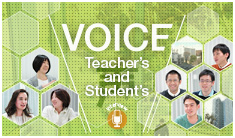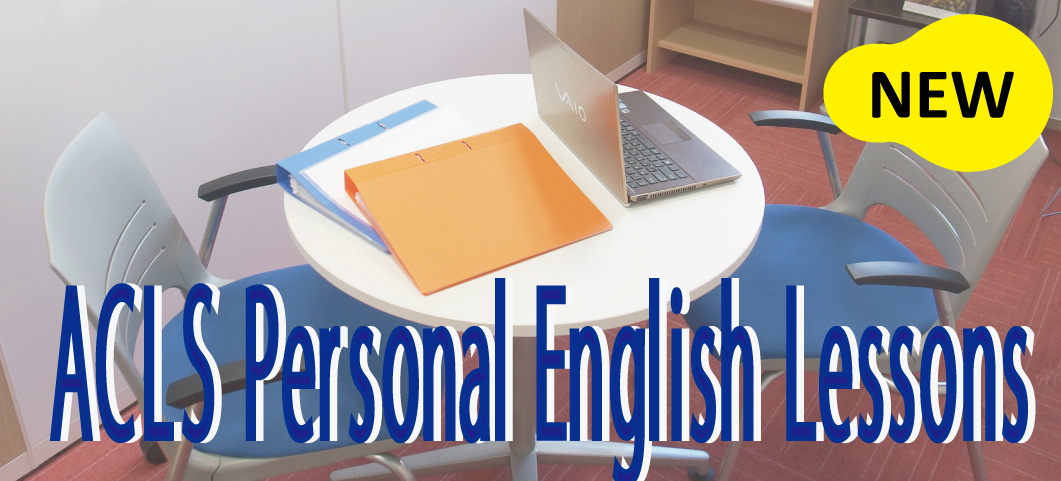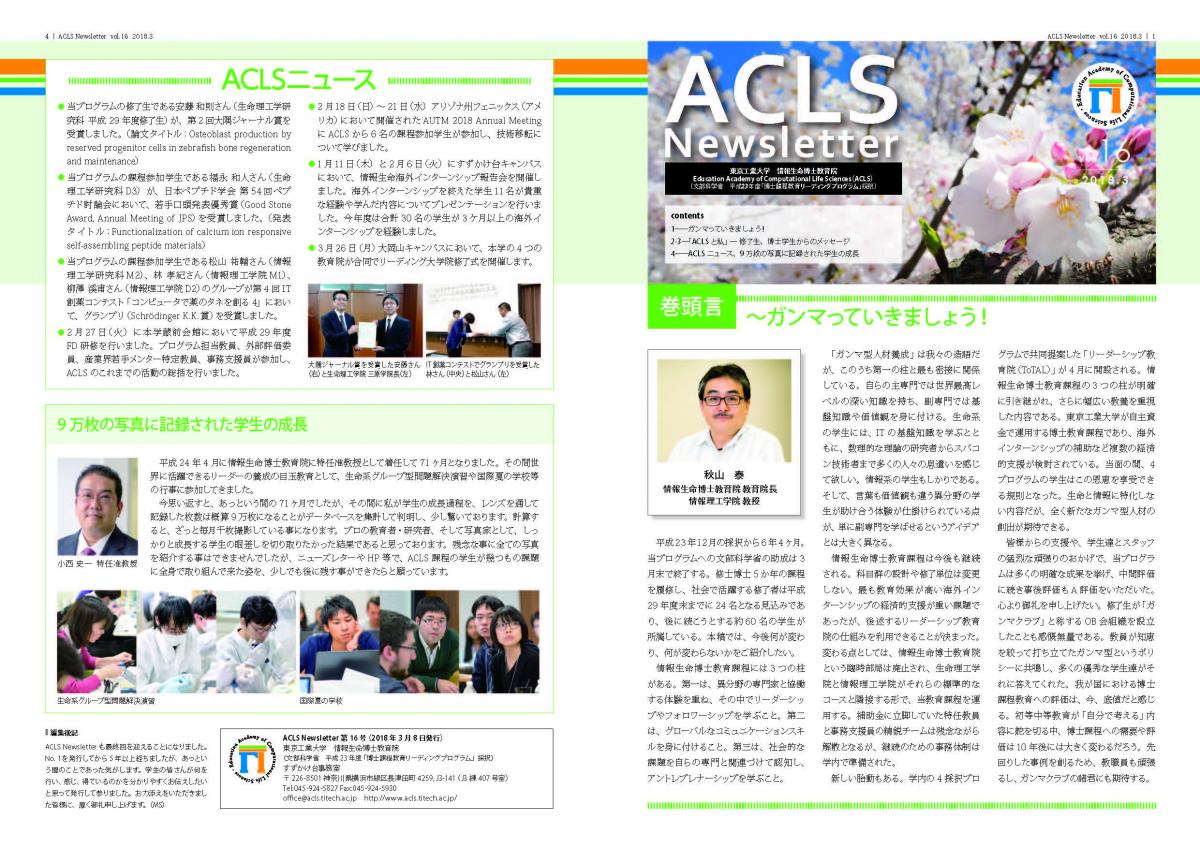- Home
- Teacher's and Student's voice
- Shuntaro Chiba
Shuntaro Chiba


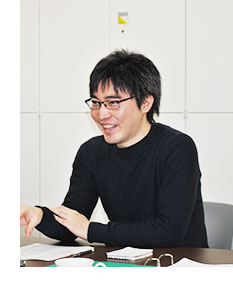 Chiba:Prior to participating in ACLS, I had studied life sciences at the Tokyo Institute of Technology. During graduate school, I majored in biomolecular engineering in the Graduate School of Bioscience and Biotechnology, where I carried out research using molecular simulation. My main research analyzed life phenomenon, such as the movement of proteins. I performed analyses on supercomputers equipped with both commercial software and computer programs that I had written.
Chiba:Prior to participating in ACLS, I had studied life sciences at the Tokyo Institute of Technology. During graduate school, I majored in biomolecular engineering in the Graduate School of Bioscience and Biotechnology, where I carried out research using molecular simulation. My main research analyzed life phenomenon, such as the movement of proteins. I performed analyses on supercomputers equipped with both commercial software and computer programs that I had written.
Ever since I was a high school student, I had interests in using physics to analyze life. This desire has led me to study both life science and computer science from undergraduate to graduate school—although I leaned slightly towards life science.
When I first learned of the educational principles at ACLS, I felt that with my background I would be able to contribute significantly to this leading program. Then I decided to apply. I felt that I was a perfect fit for the ACLS and looked forward to studying both life science and computer science together, to cultivate my knowledgeable in both areas.
I was also motivated by a desire to contribute to society. In today's world, there is large demand for professionals who tackle matters through the fusion of several different fields. Specifically, I'm referring to professionals who understand both life science and computer science, and can apply their knowledge to solving a variety of social issues. This describes perfectly the "Γ (gamma) type specialist" proposed by the ACLS. Graduate schools are expected to provide such professionals, and it is the best contribution we can make to society. Accordingly, my desire to contribute to society was a major factor in applying to the ACLS.
All of the factors above pushed me to apply to the ACLS. Since April 2013, I have been serving as a specially appointed assistant professor in this leading program.

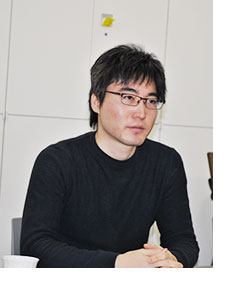 Chiba:Simply, the educational policy at ACLS is for students majoring in either life science or computer science to study the remaining field as an academic minor. However, the ACLS is much more than just that. It is a place where students from different majors cultivate each other through cooperation and mutual understanding. While there are differences in life science and computer science, the program contains various measures to ensure smooth cooperation.
Chiba:Simply, the educational policy at ACLS is for students majoring in either life science or computer science to study the remaining field as an academic minor. However, the ACLS is much more than just that. It is a place where students from different majors cultivate each other through cooperation and mutual understanding. While there are differences in life science and computer science, the program contains various measures to ensure smooth cooperation.
Allow me to give an example based on the Exercises in Molecular Simulation which I teach. In these exercises, students learn methods of molecular simulation using TSUBAME, a supercomputer owned by the Tokyo Institute of Technology. More specifically, students conduct analysis with quantum chemical calculation methods using the Schroedinger equation. This material is very advanced, normally beyond the learning scope of computer science students. It is extremely difficult for students to grasp the meaning of the equation and actually solve it by themselves. Therefore, I do not teach the meaning or logic behind the equation itself. Instead, I pay strict attention to programs using the equation, explaining how the programs are utilized and what can be understood from the results. In summary, I introduce tools which students can use to investigate ideas which interest them, and encourage them to carry out further studies.
Of course, it would be ideal to teach all aspects of the material, including background in classes. However, in reality, the amount of teaching material is limited. In relation to this, I help students to recognize tools that can be applied to their research. If interested, they can ask their classmates or teachers for more information. In other words, I not only encourage integration among students, but also, among students and instructors.
I believe that Exercises in Molecular Simulation strongly represents learning at the ACLS. In addition, students in the ACLS can use TSUBAME with almost no restrictions (see Note 1).
Note 1:TSUBAME is a large-scale supercomputer owned by the Tokyo Institute of Technology. The current version is 2.5. Although terms of use and usage restrictions apply to TSUBAME, students in the ACLS program can use the supercomputer with almost no restrictions (needs recommendation from an instructor).

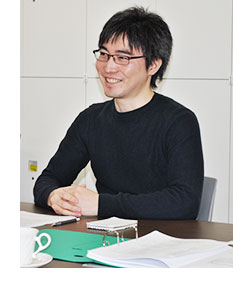 Chiba:Today's society requires professionals capable of global communication. In other words, professionals must overcome differences in nationality and culture to work together. ACLS conducts a variety of programs to equip students with such skills. Students can participate in overseas internships and classes for practical English studies (Science and Technology Communication Subjects, etc.). Another representative example is the International Summer School. The 2015 Summer School is scheduled at the University of Oxford, making it the third consecutive year that the school has been held overseas. Foreign students always participate in the program. For Japanese students, it is an outstanding opportunity to travel overseas and refine their communication skills.
Chiba:Today's society requires professionals capable of global communication. In other words, professionals must overcome differences in nationality and culture to work together. ACLS conducts a variety of programs to equip students with such skills. Students can participate in overseas internships and classes for practical English studies (Science and Technology Communication Subjects, etc.). Another representative example is the International Summer School. The 2015 Summer School is scheduled at the University of Oxford, making it the third consecutive year that the school has been held overseas. Foreign students always participate in the program. For Japanese students, it is an outstanding opportunity to travel overseas and refine their communication skills.
Another merit of the Summer School is that it is both planned and operated by students. Although instructors provide support, it is a very formidable task for students. Still, in past Summer Schools, students always rose to the challenge which, in turn, led to a successful event. For students on the event committee, it was invaluable experience.
To fully elicit such merits, it was necessary to divide preparations into tasks for instructors and tasks for students. This process was quite difficult and required a lot of trial-and-error to succeed.
Starting this year (2015 academic year), the form of the event committee for the Summer School will change. Until 2014, separate working groups were formed by instructors and students. This year, these two working groups will be combined to form a single event committee. The goal is to have students participating in the event committee in a position equal to the instructors, actively conveying their ideas, and having a leading role in preparations.

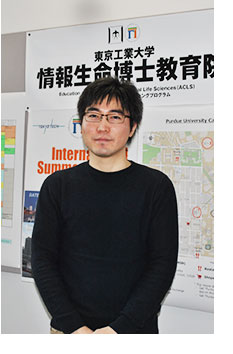 Chiba:ACLS allows students to experience diverse forms of integration. In addition to integrated studies of life and computer sciences, the program provides experience in communication and cooperation with a wide range of people.
Chiba:ACLS allows students to experience diverse forms of integration. In addition to integrated studies of life and computer sciences, the program provides experience in communication and cooperation with a wide range of people.
For example, there is the integration of age groups. Personally, I am close in age to students, so I eat meals with them and help them to overcome problems. I serve as a bridge between students and older instructors although this role is not defined in the program. Besides me, there are several other instructors who also fulfill this role. Consequently, bonds are easily formed and quickly leads to integration among the different age groups at the ACLS.
Another example is the mutual integration between program participants. In addition to classes, the ACLS offers an instructor mentor system and numerous other events which facilitate networking among students, instructors and office staff in the program. Indeed, the ACLS possesses a rare and wonderful cooperative environment where instructors and office staff work closely together, and students can come to the office for advice or just to chat. Instead of having students, instructors and staff existing in entirely independent roles, there is a fantastic atmosphere of interaction and mutual understanding. Additionally, forming friendships outside the laboratory is a great aspect of the ACLS.
Furthermore, the program provides numerous opportunities for interaction and integration with people from different cultural backgrounds. A few examples are overseas internships and the International Summer School which was discussed earlier.
There are countless other chances for integration and exchange at the ACLS. Before graduating from the program and entering into society, students will experience meeting and cooperating with many people to accomplish many great things. If this is a program that appeals to you, then I urge you to join the ACLS!
※The contents of this article are accurate at the time of the interview conducted in January 2015.





